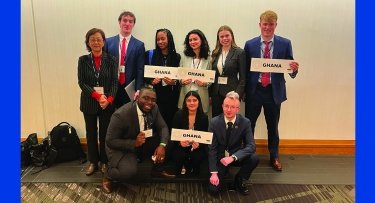Mercy’s Model U.N. Team Wins Top Award Again at National Conference

Mercy University’s Model United Nations (U.N.) team and faculty advisor Michiko Kuroda (far left) at the National Model U.N. conference in Washington, D.C.
Mercy University’s Model United Nations (U.N.) team was named Outstanding Delegation — the highest honor — and won two Outstanding Position Paper Awards at the National Model U.N. conference in Washington, D.C. in early November. Mercy represented Ghana on several simulated U.N. committees alongside delegations from over 60 other colleges and universities. The Mercy team has won awards at every Model U.N. conference they have attended over the past 11 years.
Michiko Kuroda, the faculty advisor for Mercy’s Model U.N. team, credits her high standards as well as students’ perseverance for the team’s impressive achievements. “On our team, there is a real culture of not giving up,” said Kuroda, who previously worked at the U.N. for 30 years. “Students don’t go to the conference to win necessarily, but when they get there, they really excel.”
“I was shocked but so proud that we won Outstanding Delegation since that's such a big honor,” said Luna Tejedor Amblar ’24 who served as the Mercy team’s head delegate for the first time. “Then again, I was confident in our team and knew that we’d all worked really hard to prepare.” Indeed, the team prepared and practiced extensively outside of class, meeting on Zoom and in-person in small groups in the evenings and on weekends. They also participated in simulated virtual conferences with other institutions including the University of New Haven.
James Israel Marcus ’23 enjoyed the confidence that came from experience. “At my first conference a year ago, I remember being nervous about what to expect,” he said. “This time, I focused on giving advice and comfort to my teammates. I told them to trust that they deserve to be in the room as much as anyone else.”
Amblar and Marcus both praise Kuroda’s impact on Mercy’s Model U.N. program. “The reason Mercy wins awards year after year is because of Professor Kuroda’s dedication and commitment to Mercy’s Model U.N. program,” Marcus said. “The work that she does with Mercy students is truly unmatched — everything from ensuring that we know what to say to refining our posture to coaching how we engage with other delegations.”
The impact of Mercy’s Model U.N. program goes far beyond the awards. “Before, I always doubted myself,” Amblar said. “Being on this team helped me gain confidence in myself and trust that I'm capable of succeeding. What I've learned in Model U.N. will stay with me throughout my career.”
Marcus calls Mercy’s Model U.N. program transformational. “Without a doubt, I’ve learned skills that are completely transferable to any setting,” he said. “If there were more people thinking about empathy, negotiation and active listening, we’d get a lot closer to solving the problems the world faces today.”
